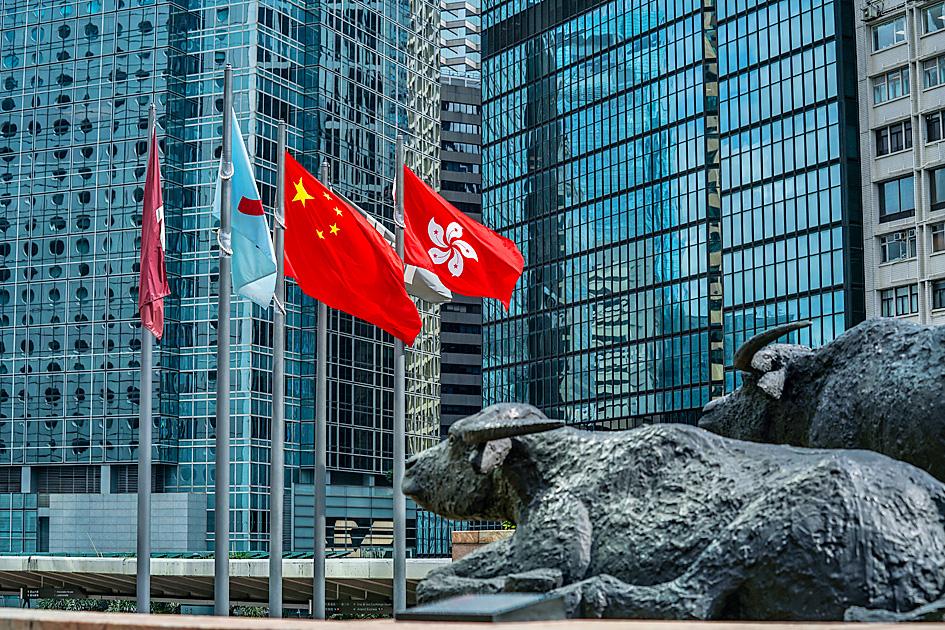An amendment to the Act Governing Relations With Hong Kong and Macau (香港澳門關係條例) proposed by the Chinese Nationalist Party (KMT) aims to protect “good” Hong Kongers, not those engaged in violence or terrorism, KMT Mainland Affairs Department director Tso Chen-dong (左正東) said yesterday.
As freedom of speech is already enshrined in the Constitution, the proposed amendment would only provide general guidelines when vetting Hong Kongers seeking asylum, Tso said, adding that it would sift out Hong Kongers who have a history of violence or have engaged in terrorism.
Political leaning should not be a criterion when checking the backgrounds of Hong Kongers seeking asylum in the Republic of China (ROC), as that is part of their freedom of speech and is different from violent behavior or participation in terrorist activities, he said.

Photo: Bloomberg
However, Kong Kong independence is a nonissue, as the Constitution states that Hong Kong is a part of the ROC, Tso said, adding that even Hong Kong pro-democracy activist Joshua Wong (黃之鋒) has claimed that he is not a proponent of the idea.
The Constitution guarantees freedom of speech and Hong Kong residents’ freedom of speech should be protected through asylum, hence the proposal, Tso said.
Asked whether granting pro-Hong Kong independence advocates asylum would negatively affect cross-strait relations, one KMT member speaking on condition of anonymity said that it could be doing Beijing a favor by solving its problem.
“Beijing would be pleased,” the member said, adding that the proposed amendment should not include any discriminatory clauses that would deny asylum to Hong Kongers with certain political leanings.

Japanese footwear brand Onitsuka Tiger today issued a public apology and said it has suspended an employee amid allegations that the staff member discriminated against a Vietnamese customer at its Taipei 101 store. Posting on the social media platform Threads yesterday, a user said that an employee at the store said that “those shoes are very expensive” when her friend, who is a migrant worker from Vietnam, asked for assistance. The employee then ignored her until she asked again, to which she replied: "We don't have a size 37." The post had amassed nearly 26,000 likes and 916 comments as of this

US President Donald Trump said "it’s up to" Chinese President Xi Jinping (習近平) what China does on Taiwan, but that he would be "very unhappy" with a change in the "status quo," the New York Times said in an interview published yesterday. Xi "considers it to be a part of China, and that’s up to him what he’s going to be doing," Trump told the newspaper on Wednesday. "But I’ve expressed to him that I would be very unhappy if he did that, and I don’t think he’ll do that," he added. "I hope he doesn’t do that." Trump made the comments in

Tourism in Kenting fell to a historic low for the second consecutive year last year, impacting hotels and other local businesses that rely on a steady stream of domestic tourists, the latest data showed. A total of 2.139 million tourists visited Kenting last year, down slightly from 2.14 million in 2024, the data showed. The number of tourists who visited the national park on the Hengchun Peninsula peaked in 2015 at 8.37 million people. That number has been below 2.2 million for two years, although there was a spike in October last year due to multiple long weekends. The occupancy rate for hotels

A cold surge advisory was today issued for 18 cities and counties across Taiwan, with temperatures of below 10°C forecast during the day and into tonight, the Central Weather Administration (CWA) said. New Taipei City, Taipei, Taoyuan and Hsinchu, Miaoli and Yilan counties are expected to experience sustained temperatures of 10°C or lower, the CWA said. Temperatures are likely to temporarily drop below 10°C in most other areas, except Taitung, Pingtung, Penghu and Lienchiang (Matsu) counties, CWA data showed. The cold weather is being caused by a strong continental cold air mass, combined with radiative cooling, a process in which heat escapes from